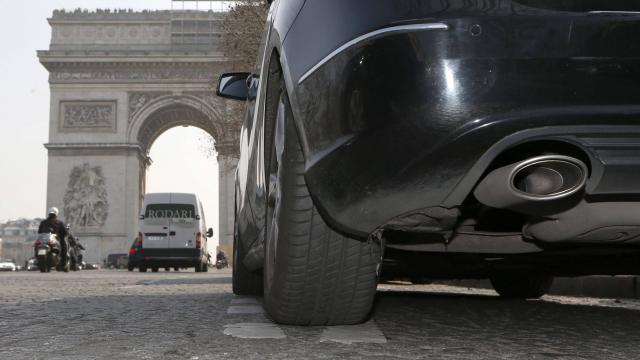Pollution: Alternating Traffic in Paris Continues this Wednesday

Faced with persistent air pollution, alternating traffic is renewed this Wednesday in Paris and its suburbs for the second consecutive day.
Between 5.30am and midnight, only vehicles whose number on the license plate is odd can circulate as those who carpool or enjoy one of the many exceptions, said the police prefecture of Paris, due to the high pollution levels in the city.
It may be “renewed Thursday if the concentration levels found on Wednesday warrant it”, said the prefect Michel Cadot.
? #Pollution : Reconduction de la #circulationalternee demain dans #Paris et les 22 communes limitrophes
? https://t.co/y8hWVhRKPd pic.twitter.com/ynN3EyARoj
— Préfecture de police (@prefpolice) December 6, 2016
Free transport
Public transport will be free again this Wednesday, as residential parking or service Vélib ‘and Autolib’ for new users for the day
However, the problems of the RER B between Aulnay-sous-Bois and Roissy airport, completely interrupted because of a failure of the overhead power lines since Tuesday morning, on the line that transports about 900 000 passengers per day, will gradually resume that from the “Wednesday mid-morning” , according to SNCF.
Furthermore the 20 km/h speed reduction measures on major roads of Ile-de-France and bypass obligation for heavy-weight in transit will continue to apply Wednesday.
In a statement, the prefect also urged Parisians, “in the situation we are” to continue “to limit their car trips and make carpooling a priority” .
Solid traffic jams
On Tuesday, despite the traffic restrictions, the traffic jams were massive and even exceeded skilled levels of an “exceptional” morning and evening at around 6pm, in the direction of roads of Ile-de-France. By mid afternoon, the prefecture said it had already verbalized 1746 people.
The “exceeded the alert threshold for particulate pollution” , a concentration greater than 80 micrograms / m3 of fine particles in the air, lasts for one week, according Airparif, the body responsible for quality monitoring air in the capital.
An effective measure?
Alternating traffic has already been set up in Paris in October 1997, March 2014 and March 2015.
Its effectiveness is questioned, particularly because it “does not target the most polluting vehicles”, according to a parliamentary report.
A new device, based on a tag system, to replace alternating traffic beginning in 2017.
Enjoyed this? Get the week’s top France stories
One email every Sunday. Unsubscribe anytime.


